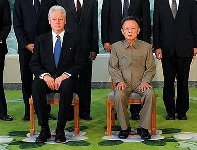
This photo taken on August 4, 2009 and released by the Democratic People's Republic of Korea's official Korean Central News Agency shows the DPRK's leader Kim Jong-Il (R) posing with former US president Bill Clinton (L) in Pyongyang. [Agencies]
SEOUL: Former President Bill Clinton urged the Democratic People's Republic of Korea (DPRK) to free detained people from the Republic of Korea (ROK) and make progress on the so called issue of seized Japanese citizens, ROK people and Japanese officials said Thursday.
Clinton made the requests to the DPRK's leader Kim Jong Il during a rare meeting in Pyongyang earlier this week that secured the freedom of two US journalists detained for 140 days for allegedly entering the DPRK illegally, the officials said.
 This photo taken on August 4, 2009 and released by the Democratic People's Republic of Korea's official Korean Central News Agency shows the DPRK's leader Kim Jong-Il (R) posing with former US president Bill Clinton (L) in Pyongyang. [Agencies] |
The ROK Foreign Ministry spokesman Moon Tae-young said he understood that Clinton conveyed to the DPRK that the ROK's worker and fishermen "should be released on humanitarian grounds."
Moon said the ROK hasn't heard how the DPRK reacted.
The ROK said Thursday it had no plan to send a special envoy to the DPRK to try to win their freedom, but it still hopes for their timely release.
In Tokyo, Chief Cabinet Secretary Takeo Kawamura told reporters that "Clinton urged Kim Jong Il to make progress" on the issue of abducted Japanese nationals. He cited an unidentified senior US government official as the source of the information.
In 2002, the DPRK admitted to having 13 Japanese nationals in the 1970s and 1980s and were reported to use them to train spies. The DPRK allowed five to return to Japan, saying the other eight had died. But Tokyo wants a deeper investigation.
However, Wood said, "He was not carrying any messages on the part of American officials."
Wood said Clinton's trip to the DPRK was a private, humanitarian mission.
Clinton himself also characterized the trip as a humanitarian mission and told reporters in New York on Thursday that his goal was to retrieve the two US journalists.
"My job was to do one thing, which I was profoundly honored to do, as an American and as a father," he said. "I wanted those young women to be able to come home. And I wanted our two countries to have the ability to decide where to go from here."
The former president added that he would not try to influence what steps either side takes, saying: "I'm glad I could be of some help, but I am not a policy maker. I shouldn't be."
Nevertheless, Clinton's trip has rekindled concerns among some in the ROK and Japan that the two countries could be marginalized as Pyongyang favors direct talks with Washington on its nuclear program.
The DPRK has quit six-nation disarmament talks and instead recently suggested one-on-one negotiations with Washington to defuse the nuclear tensions.
The US has said it is willing to hold direct talks with Pyongyang — but only on the sidelines of the six-nation nuclear talks consisting of the US, the DPRK, the ROK, China, Japan and Russia.
Moon dismissed concerns about being sidelined, noting the US informed the ROK that Clinton's private trip was aimed at securing the freedom of the two US journalists.
Kawamura also stressed that according to the senior US official, Clinton did not discuss the DPRK's nuclear issue with Kim.